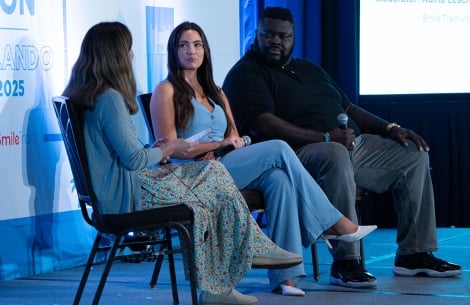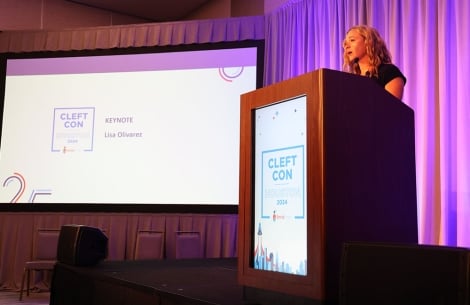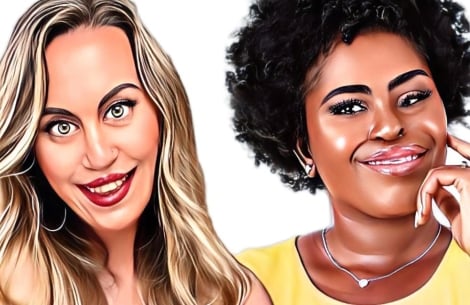To Young People with Clefts, from Cleft Con ‘24
You are NEVER alone

If there’s one thing that unites nearly every person with a cleft it’s that, at some point or another, they’ve felt all alone, misunderstood, underestimated — even by people who should know better.
Kenny Ardouin, from Christchurch, New Zealand, has felt this way many times. But there is one incident in particular that has stayed with him, etched into his mind like a scar that will never fade. When he was 12 years old, his cleft surgeon told him, “You’ll be able to talk, but you need to realize you’ll never make a career out of public speaking.”
Kenny was the keynote speaker at Smile Train’s fifth annual Global Cleft Con — an honest, immersive, interactive virtual gathering by and for the cleft community — and this was far from his first engagement. A speech-language therapist and researcher, he is now an in-demand lecturer who has spoken up for the cleft community on stages around the world and has even worked in radio.
Familiar as Kenny’s experiences being doubted may be to so many people with clefts, for a new generation of young people galvanized by examples like Kenny’s and events like Cleft Con, so is his ability to prove doubters wrong.
Smile Train Student Ambassadors Brooke Peterson and Ruth Thomas from Texas and Parker Frost from Florida embody this spirit. In Cleft Con ‘24’s most talked-about session, “Navigating School, Friendships, and Self-Confidence: A Teen's Journey with a Cleft,” they made it clear they are unsubscribing from letting others define them. Supported at every step by family, friends, and community, these young women are proud of how they were born and eager to use their clefts as tools for making the world a more accepting place for everyone
And they will never let anyone tell them there’s anything they can’t do — even their own surgeons. In that spirit, we’ve compiled some of the hard-earned advice Kenny, Ruth, Parker, and Brooke shared at their Cleft Con sessions.
Whether you find yourself on the South Island of New Zealand, the Southern United States, or somewhere in between, if you have a cleft and ever feel alone or like no one understands or believes in you, we hope that their wisdom will help you likewise tap into the strength, potential, and courage that you were also born with.
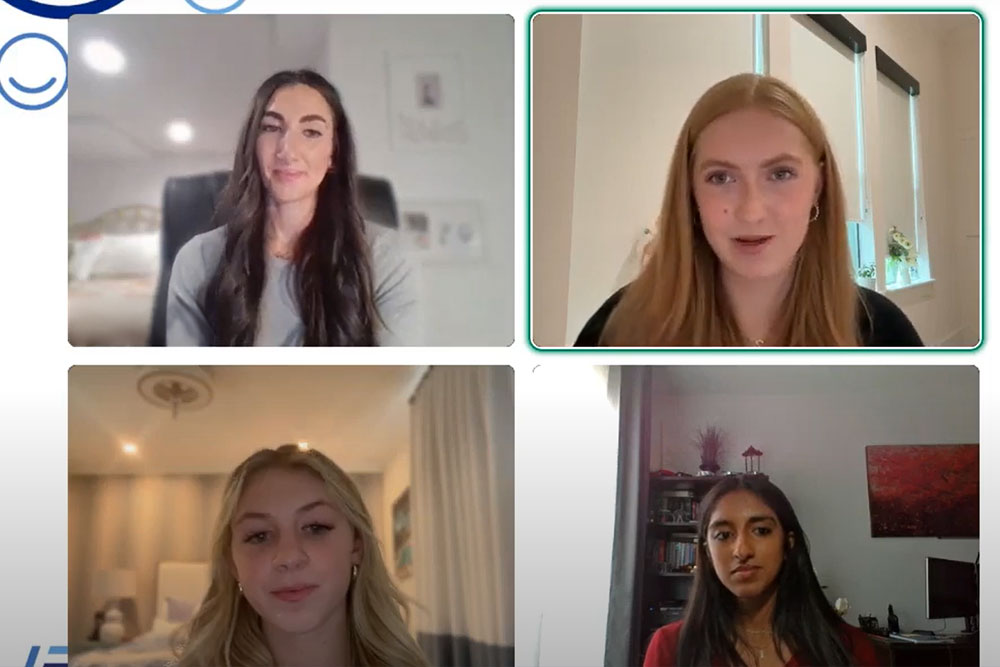
On Embracing Your Cleft
Kenny: If you're struggling to embrace your cleft, that's normal. That's understandable, and, to be honest with you, you don't have to embrace it. You don't have to love the fact that you were born with a cleft, but you should love… yourself and accept that [your] cleft is part of who you are and to change that would fundamentally change who you are, and I hope that you like who you are.
I'd like to encourage people to realize that, with a cleft, you'll be able to live a full and fulfilled life. But also, I don’t sugarcoat the fact that there are times that are hard, and that is part of the cleft journey.
Parker: Be proud of who you are. Everyone is unique. Tell people you have a cleft so everyone will know the real you. That's really important.
Ruth: Remind yourself that your cleft doesn't define who you are. It's just one small part of your personality.
On Educating Others About Your Cleft
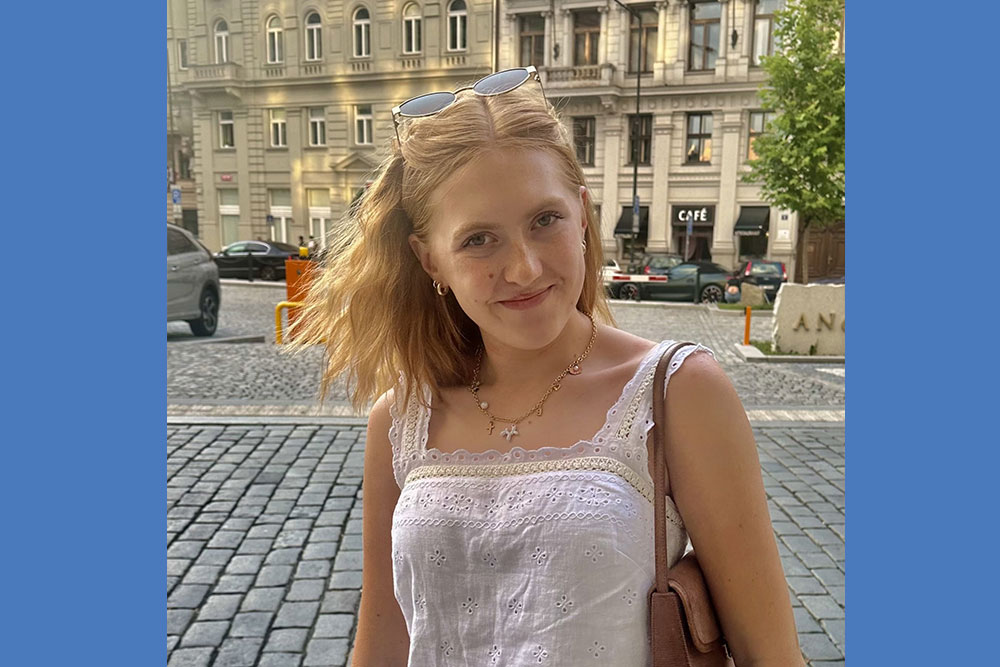
Kenny: I feel like talking candidly and honestly about the cleft journey is something that has resonated with a lot of people…. I encourage the next generation to really own their space and find their place in the cleft community and share their story.
I didn't have a choice over whether to have a cleft. What I do have a choice over is what I make of it and what I do with my life.
Brooke: Now that I’ve built my confidence, it’s okay if people ask me questions about my cleft.
Ruth: Having a cleft definitely forms your personality, and having people around who understand that definitely makes the process easier, especially in school, when other people may not understand exactly what you're going through…. I think it's really important for teachers to be aware, especially [about your] appointments. [So is] having the confidence to tell people, "Yeah, this is what I have. This is what I'm going through."
Parker: When I was younger, I wouldn't tell people [about my cleft] and waited for them to ask and even when they did ask, I wouldn't always tell the truth. I was embarrassed to say I had a cleft. I've now been very open about my cleft as a high schooler. I think I've realized that it's not something to be ashamed of. It's honestly an amazing gift and makes you unique and I love telling people about it. Their responses are all very positive, especially now that everyone's older and can understand it better. Everyone is very supportive and happy that I can tell my story.
On Bullying
Kenny: One of my strategies to manage [bullies], particularly as I got a bit older into my teenage years, was to come up to the beautiful scenic overlook of the city and the harbor because it gives you a bit of perspective on the world. You realize just how small you and that one person who is having a go at you [are], and it kind of [reminds] me that I shouldn't let my whole worldview be dictated by the opinions of somebody who I don't really care too much what they think.
My advice for other people going through it is if you are being bullied, talk to people, tell friends, talk to your parents, tell a teacher… there are people out there who will help you, but you have to let them know what's going on.
Parker: Teasing was a big thing when I was younger. You have to make sure you understand what you were born with and what it's like because informing them on what a cleft is is really, really important, especially when you're younger.
Ruth: One day I came home and was really sad after being bullied, and my parents showed me [photos from right after my first cleft surgery] and said this is how far you've come and this doesn't define who you are because you are still that same little girl and you've come so far. Now I let people ask questions and I welcome that conversation.
On Finding Community

Kenny: The cleft community needs to see themselves reflected in the people who are speaking to them. It's been great to be a person with a cleft talking about cleft. And I might be one of the earlier people to do that, but I certainly won't be the last.
Brooke: I knew nobody with a cleft and didn't seek out an online community. But joining the Student Ambassadors program has helped me so much to realize I'm not in this alone and other people can relate to me and have similar experiences. This program has honestly been amazing and huge for me.
Ruth: I had never met a single person my age with a cleft before joining Student Ambassadors. Once I joined Student Ambassadors and saw everyone's Instagrams, I realized there are so many people out there who also have clefts, and it really made for an inclusive environment. So putting yourself out there is important. My school's cleft group has made an Instagram account.
On Self-Confidence

Kenny: You're an expert in clefts because you know what it's like from having lived with it.
Ruth: When I was little, [my cleft] was definitely a topic that I would shy away from. If someone in class would ask, I would dismiss it or give a quick answer and move on. In middle school, I realized that other people look different from me, and started to hide my face in photos. That was the lowest point. In high school, I realized you can't cover your face in photos your whole life, and that was a turning point. I have a good group of friends who accepted me unconditionally. That made me a lot less private about my cleft. I would end up telling people [about my cleft] if they asked…. It raised awareness in my friend group and people saw it wasn't a downfall or something to hide from, and that helped me, too. Made me more resilient. It’s definitely a process I am still going through.
Brooke: My confidence has grown over time. I always think finding that good group of friends helps so much. Find the thing you like to do, whether it's sports or music, etc., and join that group and find the friends who value you and will always support you. That's been huge for me. Also finding out who I am as a person. Having a cleft is important to who I am, but I can't let it define me. I have so many other defining features. Figuring out who you are leads to more self-confidence.
Parker: Growing up with social [media], you see all these people, like supermodels, and it creates an unrealistic expectation. One of the most important things is realizing that everyone's unique. Something that helped in middle school was researching clefts. I saw all these people with clefts who were so pretty, and I knew that you don't have to look like the people you see on social media because most of it's fake.
Whoever you are, you can find a community passionate about clefts and building a global cleft community.

